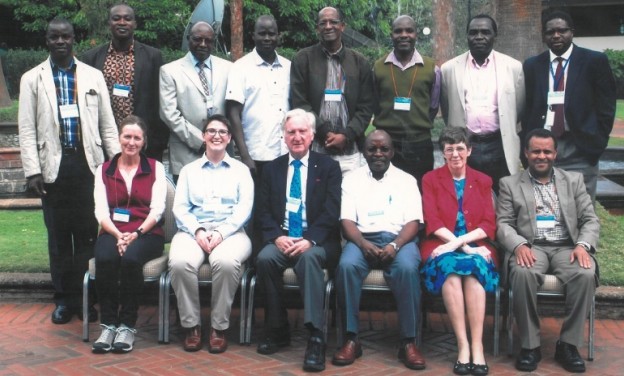“The planet needs more plant scientists” African educators meet in Nairobi to develop educational tools for a next generation of African plant breeders
MEDIA RELEASE
Educators of plant breeders in Africa met in Nairobi last week to develop new education and training materials for “Demand led plant variety design”. The educators from several African universities, regional and international organisations are sharing experiences across eastern, southern and West Africa on the content and organisation of current plant breeding courses and future needs. They are benefiting from the participation of plant breeders from the private sector who work in a market driven environment.
The new educational materials will be based on demand-led R&D. They will be available for inclusion in post graduate programs in African universities. The course materials will also be available for continuing professional development of practicing plant breeders; and they will be made available on line for open and distance learning, thus extending the reach of the new knowledge Africa-wide.
Dr Appolinaire Djikeng, Director of Biosciences eastern and central Africa – International Livestock Research Institute (BecA-ILRI) Hub, Nairobi, said: “The planet needs more plant scientists. Over the past decade, there has been rapid growth in the numbers of biomedical scientists but no growth at all in the total number of plant scientists. Yet the demand for increasing quantities and higher quality, safe and nutritious food will double over the next 50 years. The BecA-ILRI Hub is giving a strong focus to strengthening plant breeding in Africa. As a shared research platform, the BecA-ILRI Hub makes available the tools for modern plant breeding to plant breeders, especially those working on staple food crops.”
Dr Pangirayi Tongoona and Dr Agyemang Danquah, the delegates of the West African Centre for Crop Improvement (WACCI) at the University of Ghana said: “WACCI is very pleased to be associated with the development of these new education and training modules on demand-led plant variety development. We believe plant breeding should be driven by stakeholder demand and this will enhance adoption of new varieties. The inclusion of demand-led approaches to variety design will help educate young African plant breeders on the importance of understanding changing customer demands when setting targets and traits to include in their national crop breeding programs.”
Dr Heather Merk Program Lead for the Syngenta Plant Breeding Academy described the continuing education program that she leads within the Syngenta company. Dr Merk said “Continuing education and professional development of plant breeders is critically important. In the US, the National Association of Plant Breeders (NAPB) is a respected professional organisation that brings together plant breeders from the public and private sectors in the US, where (pre) plant breeding in the universities is very important. I see a similar situation in countries in Africa, where having continuing professional development available to plant breeders in both the public and private sectors will contribute to the development of market driven, well adapted and widely adopted new plant varieties of the major food crops in Africa.”
Denis Blight Crawford Fund Chief Executive, attended the training and said, “This was an enlightening experience to see how African research leaders were prepared to build on their rural consultation and farmer participatory approach to take into account the interests of the broader food chain. Our aim is to build a curriculum consisting of a range of modules usable for postgraduate training and for professional development. The Crawford Fund will look to take the learnings from the workshop and further exchanges to inform a Master Class on demand led research for senior managers in the African public and private plant breeding community. I am convinced that if we get this right we will be making a major contribution to African food security by both learning from and engaging with the growing private sector in Africa.”
Read more [PDF 630KB]

